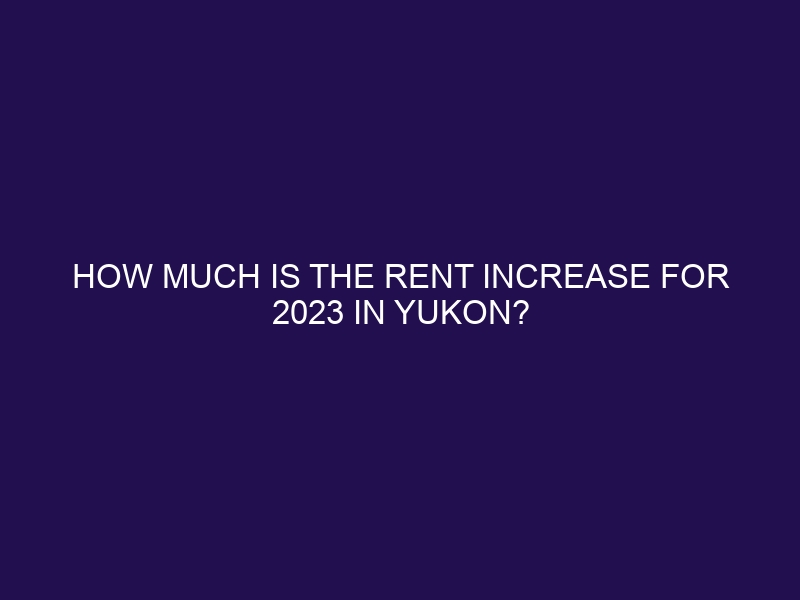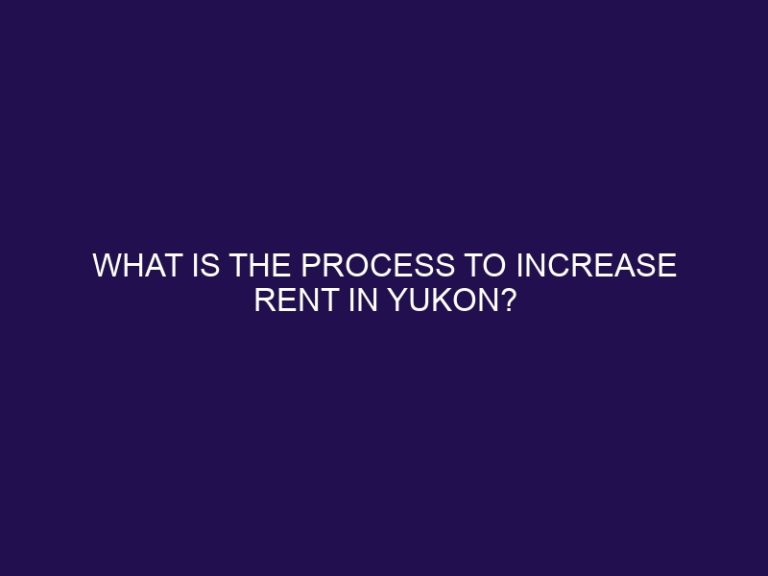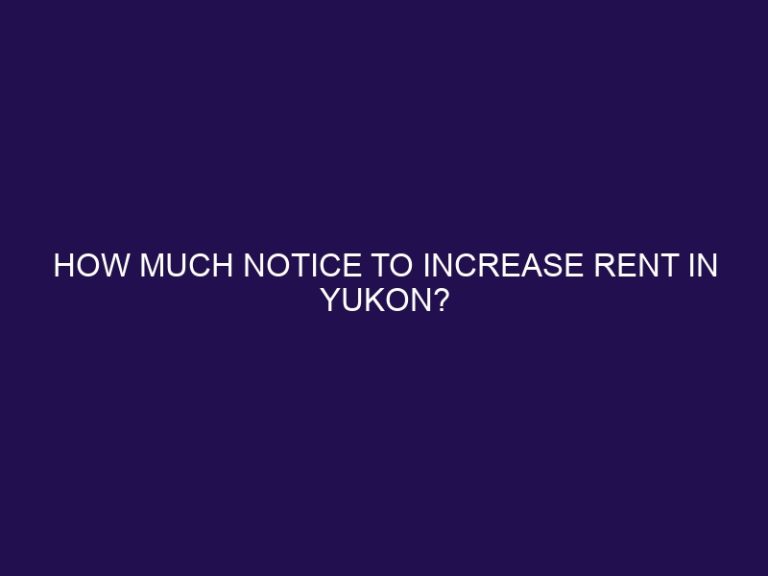How much is the rent increase for 2023 in Yukon?
.jpg)
Rent increase laws and regulations vary across different regions, and it’s essential to understand the specific guidelines in your area. In the case of Yukon, Canada, there are specific regulations in place to govern rent increases. Understanding these laws can help tenants plan their budgets and advocate for their rights.
Yukon has rent control regulations that aim to strike a balance between protecting tenants from significant rent hikes and allowing landlords to make reasonable adjustments. These regulations outline the permissible frequency and extent of rent increases in the territory. Knowing the rent control regulations in Yukon is crucial for both tenants and landlords.
Various factors influence the rent increase in Yukon. Economic considerations, such as inflation rates and the cost of living, play a significant role. housing market conditions and legislative changes can impact the rent increase landscape.
To anticipate the rent increase for the upcoming year, it’s helpful to examine historical rent increase trends in Yukon. Analyzing these patterns, along with expert predictions based on market indicators, can provide insights into what to expect for rent increases in 2023.
Rent increases can have a significant impact on tenants. Affordability concerns arise when rent hikes exceed income growth, making it challenging for individuals and families to meet their housing expenses. Vulnerable communities, including low-income households and seniors, may be disproportionately affected by rent increases.
However, tenants have rights and options when it comes to dealing with rent increases. Understanding your rights as a tenant is essential for asserting your position and negotiating with your landlord. By being well-informed and proactive, tenants can navigate rent increase situations more effectively.
Key takeaways:
- Rent increase laws in Yukon: The regulations in Yukon dictate how often landlords can increase rent, ensuring tenant protection and stability.
- Factors influencing rent increase: Economic considerations, housing market conditions, and legislative changes all play a role in determining the rent increase in Yukon.
- Rent increase predictions for 2023: Historical trends and expert predictions can provide insight into the anticipated rent increase for 2023 in Yukon.
Understanding Rent Increase Laws in Yukon
Understanding Rent Increase Laws in Yukon is absolutely crucial for both tenants and landlords. The Residential Tenancies Act in Yukon dictates the regulations and guidelines for rent increases. According to these laws, landlords in Yukon are only allowed to raise rent once every 12 months. Additionally, they must give a period of at least three months’ notice before the increase can take effect. The exact percentage of the rent increase is determined every year by the Residential Tenancy Office and may differ annually. It is essential for all parties involved to familiarize themselves with these laws to ensure they fully understand their rights and responsibilities. By having a solid grasp of the rent increase laws in Yukon and actively following them, it will help maintain a fair and balanced rental market.
What are the Rent Control Regulations in Yukon?
Rent control regulations in Yukon aim to protect tenants from unreasonable rent increases. These regulations set limits on how much landlords can increase rent and establish rules for the frequency of increases. By law, landlords in Yukon can only raise rent once every 12 months, and the increase must be within a specific percentage determined by the Residential Rental Tenancies Act. These regulations ensure that tenants are not burdened with sudden and excessive rent hikes, providing stability in housing costs. It is essential for tenants to be aware of their rights and understand the rent control regulations to protect themselves from unfair practices.
What are the Rent Control Regulations in Yukon?
Pro-tip: Stay informed about the rent control regulations in Yukon by regularly checking the Residential Tenancies Act and consulting with tenant advocacy organizations.
How often can Landlords Increase Rent in Yukon?
In Yukon, landlords can increase rent once per year, in accordance with the rent control regulations in the territory. This means that they are allowed to raise the rent on an annual basis, but they cannot do so more frequently than that. The purpose of this regulation is to offer tenants stability and prevent excessively frequent rent increases. However, landlords must still adhere to the proper procedures and provide appropriate notice when raising the rent. It is crucial for tenants to have knowledge of their rights and comprehend the laws pertaining to rent increases to safeguard themselves and potentially negotiate if needed.
Factors Influencing Rent Increase in Yukon
Rent prices in Yukon are greatly influenced by various factors. In this section, we will explore the key elements that play a role in determining the rent increase for 2023. From economic considerations and housing market conditions to legislative changes, we’ll uncover how these factors interplay and impact the rental landscape in Yukon. Prepare to dive into the intricate web of influences that affect the rental rates, giving you valuable insights into what to expect for the upcoming year.
Economic Considerations
When it comes to rent increase in Yukon, there are several economic considerations that landlords and tenants should take into account. Here are some important factors to consider:
- Inflation rate: Landlords may take into account the current inflation rate while deciding on the amount of rent increase.
- Cost of living: If the cost of living in Yukon has significantly risen, landlords may justify a higher rent to cover their expenses.
- Supply and demand: Housing market conditions and the availability of rental units may influence decisions regarding rent increase.
- Operating costs: Landlords may need to raise rents to offset increased operating costs, such as property taxes or maintenance fees.
- Investment returns: Landlords may consider the potential rental income they can earn from their property as part of their investment strategy.
- Local economy: Economic factors like job growth and wages can impact the affordability of housing and rental prices.
Considering these economic considerations can help both landlords and tenants understand the reasoning behind rent increase decisions in Yukon.
Housing Market Conditions
The rental rates in Yukon are heavily influenced by the housing market conditions. These conditions play a crucial role in determining rent increases. If there is high demand for rental properties and limited supply, landlords may capitalize on the market conditions by increasing rents. On the other hand, if there is an oversupply of rental properties and low demand, landlords may be less likely to raise rents in order to attract tenants. Additionally, changes in legislation or economic considerations can also impact the housing market conditions, which in turn can affect rent increases.
Legislative Changes
Legislative changes are of utmost importance when it comes to rent increase regulations in Yukon. It is crucial to stay well-informed about any new laws or policies that may have an impact on rent prices. Here are some key considerations regarding legislative changes in Yukon:
- Familiarize yourself with any amendments to the existing legislation that could affect rent increase rules by keeping up with updates to the Residential Tenancies Act.
- Legislative changes may determine the maximum percentage by which landlords can increase rent each year in Yukon, so it is advisable to review the maximum allowable rent increase.
- To settle disputes related to rent increases, it is essential to stay updated on any modifications to the dispute resolution process.
- Legislative changes can potentially enhance tenant rights and provide additional protections against unreasonably high rent increases, so it is important to be aware of any changes in tenant rights and protections.
Bear in mind that legislative changes can vary over time, and it is crucial to keep yourself updated with any new developments to ensure a clear understanding of the current regulations in Yukon.
Expected Rent Increase for 2023 in Yukon
Get ready, folks! We’re about to dive into the highly anticipated topic of rent increases in Yukon for 2023. In this section, we’ll uncover the expected rent increase and what it means for residents. Brace yourself for an exploration of historical rent increase trends, giving us valuable insights into past shifts in the rental market. And hold onto your seats as we share expert predictions on what the future holds for rent increases in 2023. It’s time to break it all down and get a clearer picture of what to expect in Yukon next year!
Historical Rent Increase Trends in Yukon
Throughout the years, Yukon has experienced a consistent trend of annual rent increases, as shown by the historical rent increase trends in Yukon. From 2015 to 2020, the average rent increase has ranged from 2.5% to 3.2%. These trends demonstrate a steady growth in rental prices over the past six years.
Various factors, including economic conditions and housing market dynamics, have influenced these historical rent increase trends in Yukon. As the demand for rental properties continues to rise and the cost of living increases, it is expected that rent increases will persist in the future.
Tenants in Yukon should be aware of these historical rent increase trends when planning their budget and negotiating rental agreements. By considering the average rent increase over the years, tenants can make informed decisions about their housing expenses.
Expert Predictions for Rent Increase in 2023
Expert predictions for rent increase in 2023 indicate that the rental market in Yukon is expected to continue experiencing growth. Factors such as a strong economy, increasing population, and limited housing supply contribute to this projection. Industry experts suggest that the rent increase in 2023 may be higher than previous years, potentially exceeding the average rental inflation rate. This could pose challenges for tenants, particularly those with lower incomes or in vulnerable communities. It is important for tenants to understand their rights and negotiate with landlords effectively to minimize the impact of rent increases.
In a similar tone, a true story highlights the impact of rent increase on tenants. Jane, a single mother, had been living in an apartment for years. When the landlord informed her of a significant rent increase, she faced a difficult situation. With limited options and a tight budget, Jane had to research and advocate for herself. Ultimately, she was able to negotiate a more manageable rent increase and secure her housing stability for the coming year. This story emphasizes the importance of tenant empowerment and understanding rights in dealing with rent increase situations.
Impact of Rent Increase on Tenants
Rent increase can have a significant impact on tenants, affecting their financial well-being and livelihoods. In this section, we’ll explore the consequences of rent increase on tenants, with a focus on affordability concerns and the impact on vulnerable communities. Discover the challenges faced by individuals and families in meeting rising housing costs and the potential implications for those who are already marginalized. Brace yourself for a look into the real-life effects of this often-overlooked issue.
Affordability Concerns
Affordability concerns related to rent increases in Yukon can have a significant impact on tenants. Here are some key points to consider:
- Affordability burden: Rent increases can create a financial strain, making it challenging for tenants to meet their monthly housing expenses.
- Limited options: Rising rents may limit affordable housing options, forcing tenants to either downsize or relocate to areas with lower rental rates.
- Displacement risk: Rent increases can contribute to the displacement of vulnerable communities, such as low-income households or marginalized groups.
- Long-term financial planning: Unpredictable rent increases make it difficult for tenants to plan for their future, affecting their ability to save or invest in other areas.
Historically, rent increases in Yukon have been driven by factors such as housing market conditions and legislative changes. It is crucial for policymakers and stakeholders to address affordability concerns and ensure sustainable rental housing options for all residents.
Impact on Vulnerable Communities
The impact on vulnerable communities caused by rent increase can be significant and concerning. Here are some key effects:
- Financial burden: Rent increases can create financial hardship for individuals and families with limited income, making it difficult to afford other essential needs.
- Displacement: Higher rents may force vulnerable communities, such as low-income families or individuals experiencing homelessness, to relocate and disrupt established support systems.
- Housing instability: Rent hikes can contribute to housing instability, as vulnerable individuals may struggle to find affordable alternatives and face the risk of homelessness.
- Health consequences: Stress and anxiety resulting from the uncertainty of affordable housing can negatively impact the mental and physical well-being of vulnerable community members.
- Education and employment barriers: Displacement due to rent increases can disrupt access to schools, job opportunities, and essential services, further marginalizing vulnerable communities.
Tips for Dealing with Rent Increase
Are you worried about the upcoming rent increase in Yukon? In this section, we’ll give you some valuable tips on how to navigate this situation. First, we’ll help you understand your rights as a tenant, empowering you with knowledge to protect yourself. Then, we’ll equip you with effective negotiation strategies to use when dealing with your landlord. Get ready to take charge and ensure a fair rent increase for 2023.
Understanding your Rights as a Tenant
Understanding your rights as a tenant is of utmost importance when it comes to dealing with rent increase in Yukon. It is crucial to be well-informed about the rent control regulations in Yukon, which govern how frequently landlords can raise the rent. The upward adjustment of rent can be influenced by economic factors, housing market conditions, as well as changes in legislation. As a tenant, you might have concerns regarding affordability, and the rent hike could potentially impact vulnerable communities. To effectively address rent increase, it is vital to have a comprehensive understanding of your rights as a tenant and, if necessary, engage in negotiations with your landlord. Equipping yourself with this knowledge will not only safeguard your interests but also ensure a fair rental agreement.
Negotiating with your Landlord
Negotiating with your landlord can be an effective strategy to manage and potentially minimize the impact of a rent increase. Here are some valuable tips to consider:
-
Research: It’s important to research and understand your rights as a tenant and familiarize yourself with the local rental laws before engaging in negotiations with your landlord.
-
Open Communication: Take the initiative to have an open and honest conversation with your landlord to discuss your concerns and explore potential alternatives in order to find a resolution.
-
Present Evidence: To negotiate a fair rent increase, gather supporting evidence such as current market rental prices or any improvements made to your rental unit that could justify a lower increase.
-
Consider Lease Terms: Consider proposing longer lease terms or offering to make improvements to the property as bargaining points to potentially achieve a lower rent increase from your landlord.
-
Explore Options: If the proposed increase is unaffordable, try negotiating for a smaller increase or explore the possibility of a rent subsidy to ease the financial burden.
Some Facts About Rent Increase for 2023 in Yukon:
- ✅ Rent increases in Yukon for 2023 are capped at five percent (Source: Our Team)
- ✅ The new rent control regulations ban evictions “without cause” unless the landlord or a family member plans to occupy the unit (Source: Our Team)
- ✅ Landlords face rising costs for insurance, property tax, interest rates, and repairs (Source: Our Team)
- ✅ Existing renters in Yukon benefit from a 1.8 percent reduction in inflation-adjusted rent (Source: Our Team)
- ✅ Rent increases in Yukon are calculated using the annual Consumer Price Index (CPI) for Whitehorse (Source: Our Team)
Frequently Asked Questions
1. What is the rent increase for 2023 in Yukon?
According to the Yukon government, residential rent increases for 2023 will be indexed to the Consumer Price Index (CPI) for Whitehorse. Landlords can increase rents up to the previous year’s CPI, with exceptions for years of unusually low or high inflation. The rent increase cannot exceed 2% if the previous year’s CPI was less than 2%, and cannot exceed 5% if the previous year’s CPI was greater than 5%.
2. How is the rent increase calculated in Yukon?
The rent increase in Yukon is calculated using the annual CPI for Whitehorse, which reflects changes in consumer prices experienced by Yukoners. Landlords are allowed to increase rents up to the previous year’s CPI, within the specified limits based on the CPI. This ensures reasonable and predictable rent increases for landlords and tenants.
3. Are there any exemptions to the rent increase regulations in Yukon?
Housing agencies, such as the Yukon Housing Corporation, Grey Mountain Housing Society, and Kwanlin Dün First Nation, are exempt from the rent index if they tie rent increases to tenant income. This exemption allows these agencies to consider tenants’ income and ensure affordable housing options for Yukoners.
4. Can landlords increase rent above the specified limits?
No, landlords in Yukon cannot increase rent above the specified limits set by the rent increase regulations. Rent increases cannot exceed 2% if the previous year’s CPI was less than 2%, and cannot exceed 5% if the previous year’s CPI was greater than 5%. This helps maintain stability and affordability in the rental housing market.
5. Are rent increases mandatory in Yukon?
No, rent increases are not mandatory in Yukon. The rent index allows landlords to plan for the future with reasonable and predictable rent increases, but it is up to the landlords to decide whether to increase rents. Landlords can choose not to increase rent if they wish to maintain current rental rates.
6. How does the rent increase regulation impact existing renters and landlords?
Existing renters in Yukon benefit from a 1.8 percent reduction in inflation-adjusted rent under the rent increase regulation. However, landlords face rising costs for insurance, property tax, interest rates, and repairs. The regulation limits the ability of landlords to evict tenants without cause, which may particularly affect small-time landlords who may struggle with problematic tenants. Landlords may choose to sell their units or find creative ways to keep them in the rental market.







